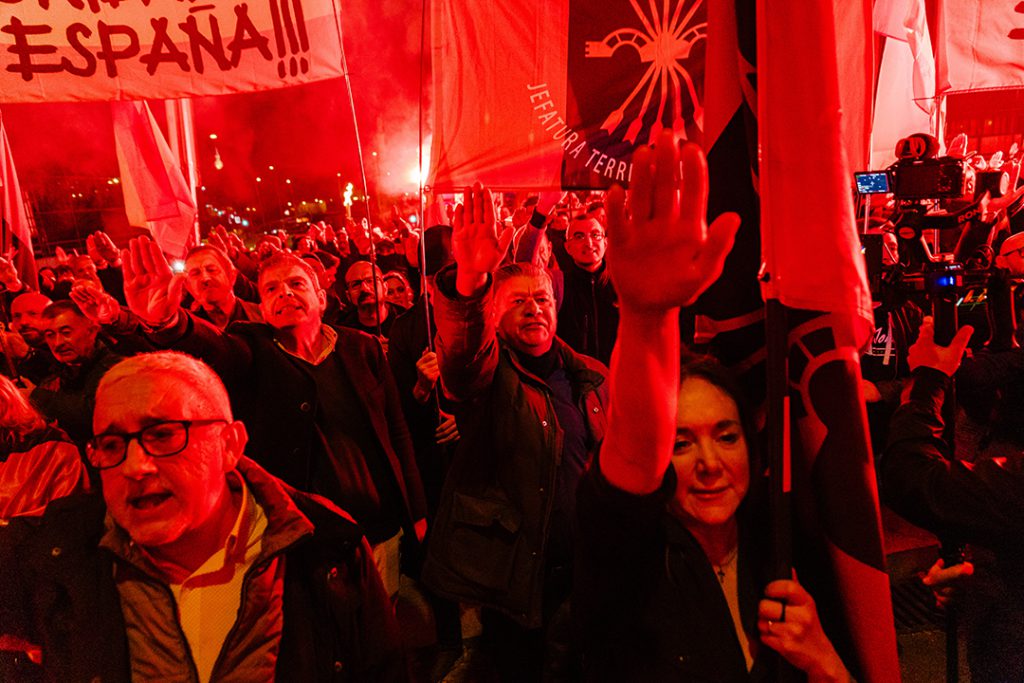North of Madrid, one can see the enormous 150 meter cross atop the Basilica of what was known as the Valley of the Fallen. This Francoist mausoleum, built by thousands of anti-fascist prisoners after the Civil War, housed the remains of dictator Francisco Franco and Falangist ideologue José Antonio Primo de Rivera until recently. In 2019 and 2023, the social-democratic government exhumed both bodies to prevent fascist pilgrimages and tributes, though hundreds of unidentifiable bodies belonging to repressed anti-fascists remain buried there. On November 20th, the anniversary of Franco and José Antonio’s deaths, tributes at this monument have ceased, but it remains a place of worship for fascists worldwide.
Decades after Franco’s death, his nostalgic followers who still publicly display their allegiance are now politically irrelevant caricatures. Those who were part of the regime’s elite became democrats during the 1980s, leaving a handful of fanatics to publicly uphold the dictator. The fascist party Fuerza Nueva lost its parliamentary representation in 1982, and the conservative party, initially Alianza Popular and then Partido Popular (PP), has since encompassed the entire spectrum of Spanish right-wing politics, led by former Franco ministers and ex-members of his regime.
However, in November 2023, prior to the inauguration of the new social-democratic government, which has the support of the pro-independence and left-wing parties, the extreme right has shown itself in the streets and has instigated riots by trying to attack the headquarters of the country’s ruling party, the Socialist Workers’ Party of Spain (PSOE). Encouraged by the opposition led by the conservative PP and the far-right Vox party, thousands of people have taken to the streets to denounce the pacts with the separatists, which include an amnesty for those prosecuted for the independence referendum organized by the Catalan government and civil society in October 2017, and for which several politicians and activists were imprisoned. All the small Nazi and fascist, ultra-Catholic and Francoist groups have also attended these protests, taking advantage of the media spotlight to show off and announce their existence. At the same time, 50 former officials from the Spanish Army have signed a manifesto demanding the removal of the president. They are calling upon those ‘responsible for defending the constitutional order’ to dismiss Pedro Sánchez and to call for new elections.
The transition to democracy forgave all repressors from the dictatorship era, and even the social-democratic government elected in 1982 failed to purge the police forces of torturers. In the 1980s, this government promoted the creation of paramilitary groups acting under the secret services’ approval against radical left-wing political organizations. The Official Secrets Act still prevents full disclosure of these and other historical episodes when Spain was a haven for neo-fascist terrorists globally, many from the NATO-funded Gladio Network, aiming to exterminate the radical left. This transition not only guaranteed impunity for the crimes of Franco’s regime but also ensured that the silence on Franco’s repression has been maintained until today. There are still numerous mass graves spread throughout the country with the remains of dozens of those who the fascists had retaliated against during and after the Civil War (1936-1939), in which Italian fascist troops and German Nazis actively participated to help Franco against the Republic. According to the United Nations, there are more than 110,000 missing people, and it was not until recent years that relatives have received help from some public administrations to search for and identify their remains, eighty years later.
Until 2018, Spain was one of the few European countries without an open extreme right-wing party in parliament. It is what the Catalan historian Xavier Casals called the ‘absent presence‘, it existed but was not represented for various reasons. According to the historian: “their old-fashioned and isolated political culture; their lack of skills to create an organization; the existence of a democratic right; and the increasing generation gap between the younger and the older ranks. Upon these grounds, the claims made by the European extreme right (xenophobia, neopaganism) have gained a foothold in Spain”.
The Rise of Vox and the Shift in Spanish Political Landscape
That changed with Vox, which now participates in several regional and municipal governments and was the third-largest party in the last elections with over 12% of votes. Until then, the extreme right was comfortably ensconced within the PP, and smaller neo-Nazi and fascist parties never gained representation. However, their street violence has been present and has claimed dozens of lives since the 1990s.
Vox emerged in 2014 from an internal revolt within the Spanish right against the main conservative party, the PP, accusing it of cowardice for not repealing some social-democratic laws when regaining power. Vox gained popularity after the 2017 Catalonia referendum, a pivotal event where Catalonia’s attempt to declare independence from Spain led to a major national crisis. The referendum was a catalyst for heightened nationalist sentiments across Spain, providing a fertile ground for Vox’s rise. Its public stance on defending Spanish unity, combined with numerous corruption cases within the PP, led Vox to win 52 seats in the 2019 elections.

Vox is led by Santiago Abascal, a former PP member from the Basque Country, a region with a distinct cultural and political history in Spain. Abascal’s transition from a traditional conservative party to leading Vox marks a significant shift in Spain’s political landscape, mirroring broader European trends. Vox was revealed in 2019 to have been funded by the Iranian opposition group, the National Council of Resistance of Iran (NCRI), with over a million euros. This funding was supposedly in gratitude for the previous Vox leader and ex-PP MEP Alejo Vidal-Quadras’ support of their cause. Vidal-Quadras suffered an attack in early November 2023, when unknown assailants shot him in the face. The politician pointed to Iran’s secret services as possibly responsible for the attack, due to his relationship with the opposition group that financed his far-right party Vox in its beginnings. The perpetrator of the attack is still unknown.
Vox’s strategy was influenced by Rafael Bardají, a former advisor to Spanish ex-president José María Aznar (PP), who was complicit in George W. Bush’s 2003 Iraq invasion. Bardají, associated with the Friends of Israel Initiative and prominent global neo-cons like Trump’s ex-National Security Advisor John Bolton, met with Steve Bannon, a strategist for Donald Trump and the North American Alt-Right, and imported these techniques to Spain during a time when the global extreme right was gaining momentum.
In 2017, the Friends of Israel Initiative published a report titled ‘An approach to the ‘New [Alt] Right’ in Europe’, highlighting the strategic shift of global extreme right groups from traditional anti-Semitism to Islamophobia, now portraying Islam as the enemy of Western civilization, aligning them with Israel. Recently, Vox successfully pushed for Madrid to award Israel a city honor medal.


Internationally, Vox aligns more with the US neo-con right than any other factions in the Western European right. Its main allies in Europe include Poland’s PiS, Orbán’s party in Hungary, and Giorgia Meloni in Italy – parties that are ultra-conservative morally and ultra-liberal economically. It also has support from Israeli Likud members and has forged anti-communist, reactionary alliances in Latin America against left-wing governments and candidates, with allies like Álvaro Uribe, Jair Bolsonaro, Javier Milei, José Antonio Kast, Keiko Fujimori, and Mexico’s PAN.
Beyond Vox, other extreme right groups exploit the normalization of hate speech and reactionary frameworks to expand their activities. Though electorally irrelevant, groups like España2000, mainly in Valencia, and other fringe groups like Democracia Nacional (DN), La Falange, Falange de las JONS, Falange Auténtica, and the Spanish Catholic Movement, remain active. Their activities have notably decreased since Vox’s emergence. Falangism continues to be the most important brand of fascism in Spain, contemporary and historically related to Nazism and Italian fascism, with whom it shared a certain social discourse, but crossed by a deep Catholic fundamentalism. During the dictatorship, there was a certain ideological distancing from the Franco regime, which tried to accommodate it to the regime to cushion its demands and domesticate its representatives and followers. Today, only a few dozen people attend the events of the different phalanxes that exist, and they have become more of a fascist folk element than a relevant political faction.
Other significant extreme right groups in Spain include Catholic fundamentalists with a network of organizations in Spain and internationally. The main one is HazteOir, linked to the ultra-Catholic sect El Yunque and its international arm, CitizenGo, operating in various countries against women’s and LGBTQ+ rights. This organization also has connections with the Phoenix Institute in the US and faces opposition from a segment of the Spanish Catholic Church.
Local groups, descendants of old neo-Nazi factions, now operate as legal associations conducting specific campaigns, following the Italian Casa Pound and French Identitarian model. Prominent among these is Hacer Nación, active in Gijón, Madrid, and Málaga, and other local brands in Barcelona, Mallorca, Valencia, Valladolid, and Zaragoza, primarily organizing conferences and propaganda actions. Football stadiums’ ultra stands continue to be significant concentration points for neo-Nazi groups, many linked to the above mentioned political groups and other European far-right ultra-groups. Secretly organized neo-Nazi concerts in Spain continue to avoid anti-fascist disruption.
In October 2023, police dismantled the Spanish section of the Nazi group Combat18, arresting 16 people, mainly in Catalonia. This organization, considered terrorist in several countries, is linked to the international Nazi group Blood & Honor, dismantled in Spain in 2004 alongside the Spanish Hammerskin section. These groups had weapons and plans for violence against Jews, Muslims, LGBTQ+ individuals, and leftist activists. Yet, no far-right organization or individual in Spain has been tried for terrorism, not even Manuel Murillo, a far-rightist arrested in 2018 for planning to attack the President of the Government, Pedro Sánchez, who possessed a huge arsenal of weapons. He was sentenced in November 2022 to seven years in prison. However, the case was not judged as terrorism.
The infiltration of ultra-right elements in the Armed Forces and police has been a fact since the end of the dictatorship. Beyond the lack of purging post-Franco, numerous cases of fascist exaltation in Spanish military barracks and the presence of on-duty police in fascist locales with extensive far-right propaganda have been reported.
In April 2021, a hooded Spanish soldier denounced in an interview with Lamarea.com the presence of neo-Nazi cells in the Army and the permanence of a Francoist sector in the high command with the complacency of successive governments, which have no intention of acting against this. This has had no consequences, and even the so-called progressive government has not acted on this issue. Some police and military personnel are part of Vox’s electoral lists, and others are active on social media, constantly linking immigration to crime and spreading false news.
Current Challenges: Neo-Fascism and Political Dynamics in Modern Spain
With Vox’s emergence in institutions and its normalization in the Spanish political and media landscape, the far-right is no longer led by Nazi and fascist groups. It is now mainly represented by this party and a series of organizations, many created online through social media, that organize protests and campaigns following the party’s agenda and reproducing its messages. There are also numerous social media influencers popularized by their agitation and disinformation campaigns against the government, social movements, and left-wing activists. Although their organic link to Vox or other organizations is challenging to trace, their actions appear coordinated, following the North American Alt-Right style and techniques.
The far-right in Spain is experiencing a resurgence after being contained by the PP for many years and is in tune with global far-right trends. Although street violence and the activity of Nazi and fascist groups have decreased, despite the events in early November 2023 against the new government, institutionalized neo-fascism has consolidated and now governs several territories, normalizing its discourse in public opinion. This has led the conservative party, the PP, to radicalize its discourse, often using the same frames as Vox to try to regain those votes.

The new government of social-democrat Pedro Sánchez, supported by left-wing and separatist parties, has used this right-wing radicalization to present itself as a containment dam, although its policies often differ little from those promoted by the far right and fail to address the issues that the far right then capitalizes on, as has happened in other European countries. Beyond the approval of several laws on rights and equality by the progressive government, the structural problems inherent to neoliberalism that allow the extreme right to validate their positions remain unaddressed. The government’s immigration policies, in line with the policies of the European Union, as well as the security policies and the persecution of left-wing political dissidence with laws approved by the right in previous legislatures, are claimed and maintained by the so-called progressive government. Also, international politics, obedience to NATO, and the lukewarm response to the genocide in Palestine continue to be uncomfortable topics for a large part of the left-wing electorate who, although they prefer this government to the right-wing one, do not fail to point out these contradictions of the government, which is presented as a vaccine against the extreme right.
“No government fights fascism to destroy it. When the bourgeoisie sees that power is slipping out of its hands, it brings up fascism to hold onto their privileges.” – Buenaventura Durruti.






